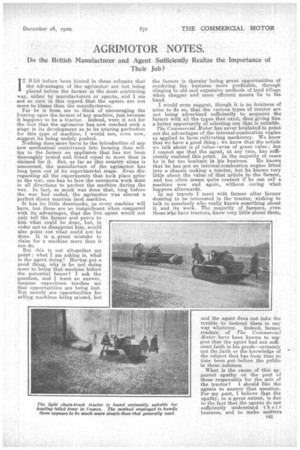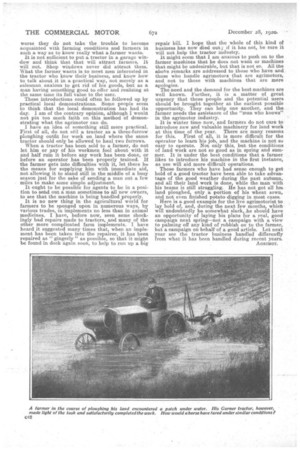AGRIMOTOR NOTES.
Page 27

Page 28

If you've noticed an error in this article please click here to report it so we can fix it.
Do the British Manufacturer and Agent Sufficiently Realize the Importance of Their Job ?
IT HAS before been hinted in these columns that the advantages of the agrimotor are not being placed before the farmer in the Most convincing way, either by manufacturers or agents, and I am not so sure in this regard that the agents are not more to blame than the manufacturers.
Far be it from me to think of encouraging the foisting upon the farmer of any machine, just because it happens to be a tractor. Indeed, were it not for the fact that the agrimotor has now reached such a stage in its development as to be nearing perfection for this type of machine, I would not, even now, suggest its being unduly pushed.
Nothing does more harm to the introduction of any new mechanical contrivance into farming than selling to the farmer an appliance that has not been thoroughly tested and found equal to more than is claimed for it.. But, as far as this country alone is concerned, the manufacture of the agrimotor has long been out of its experimental stage. Even disregarding all the experiments that took place prior to the war, one has to face the enormous work done in all directions to perfect the machine during the war. In fact; so much was done that, long before the war had ended, the agrimotor was almost a perfect direct traction land machine.
It has its little drawbacks, as every machine will have, but these are so insignificant when compared with its advantages, that the live agent would not only tell the farmer and prove to him what could be done, but, in order not to disappoint him, would also point out what could not be done. It is a great mistake to claim for a machine more than it can do. , But this is not altogether my point ; what I am asking is, what is the agent doing? Having got a good thing, why is he not doing more to bring that machine before the potential buyer? I ask the question, and I want an answer, because experience teaches me that opportunities are being lost. Not merely are opportunities for selling machines being missed, but the farmer is thereby losing great opportunities of rendering his business more profitable, through clinging to old and expensive methods of land tillage when cheaper and more efficient means lie to his hand.
I would even suggest, though it is no business of mine to do so, that the various types of tractor are not being advertised sufficiently to acquaint the farmer with all the types that exist, thus giving him a, better opportunity of selecting one that is suitable.
The Commercial Motor has never hesitated to point out the advantages of the internal-combustion engine as applied to farm cultivating machinery. We know that we have a good thing; we know that the article we talk about is of value—even of great value ; but I cannot see that the agent, at any rate, has sufficiently realized this point. In the majority of cases he is far too hesitant in his business. He knows that he has got an internal-combustion engine fitted into a chassis making a tractor, but he knows very little about the value of that article to the farmer, and too often seems quite content if he can sell a machine now and again, without caring what happens afterwards.
In my travels I meet with farmer after farmer desiring to be interested in the tractor, wishing to talk to somebody who really knows something about it and its work. The majority of farmers, even those who have tractors, know very little about them,
and the agent does not take the trouble to instruct them in any way whatever. Indeed, farmer readers of The Commercial Motor have been known to suggest that the agent had not sufficient faith in his .goods—certainly not the „faith or the knowledge of the subject that has from time to time been put before the public in these columns.
What is the cause of this apparent apathy on the part of those responsible for the sale of the tractor ? I should like the agents to answer that question. For my part,. I believe that the apathy, to ai great extent, is due to the fact that the agents do not sufficiently understand their business, and to make matters worse they do not take the trouble to become acquainted with farming conditions and farmers in such a way as to know really what a farmer wants.
It is not sufficient to put a tractor in a garage window and think that that will attract farmers. It will not. Shop windows never did attract them. What the farmer wants is to meet men interested in the tractor who know their business, and know how to talk about it in a practical way, not merely as a salesman anxious to get rid of his goods, but as a man having something good to offer and realizing at the same time its full value to the user.
These introductions could often be followed up by practical local demonstrations. Some people seem to think that the local demonstration has had its day. I am of the contrary opinion, although I would not pin too much faith on this method of demonstrating what the agrimotor can do. I have an idea of something still more practical. First of all, do not sail a tractor as a three-furrow ploughing outfit for work on land where the same tractor should only be allowed to haul two furrows. When a tractor has been sold to a farmer, do not let him or any of his workmen fool about with it and half ruin it before any work has been done, or before an operator has been properly trained. If the farmer gets into difficulties with it, let there be the means for supplying him with immediate aid, not allowing it to stand still in the middle of a busy season just for the sake of sending a man out a few miles to make some simple adjustment. It ought to be possible for agents to be in a position to send out a man sometimes to all new owners, to see that the machine is being handled properly.
It is no new thing in the agricultural world for farmers to be sponged upon in numerous ways, by various trades' in implements no less than in animal medicines. I have, before now, seen some shockingly bad repairs made to tractors, and many of the other more complicated farm implements. I have heard it suggested many-times that, when an implement has been taken into the repairer, it has been repaired as " gingerly " as possible, so that it might be found in dock again soon, to help to run up a big
repair bill. I hope that the whole of this kind of business has now died out a if it has not, be sure it will not help the tractor industry. It might seem that I am anxious to push on to the farmer machines that he does not want or machines that might be undesirable, but that is not so. All the aboVe remarks are addressed to those who have and those who handle agrimotors that are agrimotors, and not to those with machines that are mere apologies. The need and the demand for the best machines are well known. Further, it is a matter of great urgency that these people and the potential users should be brought together at the earliest possible opportunity. They e-an help one another, and the farmer needs the assistance of the "man who knows" in the agrimotor industry. It is winter time now, and farmers do not care to introduce new and valuable machinery for land work at this time of the year. There are many reasons for this. First of all, it is more difficult for the operator to learn his job, and the machine is not so easy to operate. Not only this, but the conditions of land work are not so good as in spring and summer. It is under the best conditions that a farmer likes to introduce his machine in the first instance, as use will aid more difficult operations.
Those farmers who have had sense enough to get hold of a good tractor have been able to take advantage of the good weather during the past autumn, and all their land work is done, while the man with his teams is still struggling. He has not got all his land ploughed, only a portion of his wheat sown, and not even finished potato digging in most cases.
Here is a good example for the live agrimotorist to lay hold of, and, during the next few months, which will undoubtedly be somewhat slack, he should have an opportunity of laying his plans for a real, good campaign next spring—not a campaign with a view to palming off any kind of rubbish on to the farmer, but a campaign on behalf of a good article. Let next year see the tractor business handled differently from what it has been handled during recent years.
Acnumor.






























